

Join Our Book Club!
Each month we read a new book that's designed to empower ourselves and our businesses. We meet weekly to discuss our takeaways and share ideas. If you like sharing ideas with others, seeing new perspectives, or just like having fun, this is the group for you! Drop in whenever you're able to. We work around any schedule!
This group has been an invaluable resource for those wanting to improve themselves and their businesses. We'd love to have you join and see what you can get out of this group!
We meet virtually Wednesday at 12pm PST / 3pm EST
What Members Say About Krista's Book Krew
"This book study was a game changer for me. The group of powerhouse people that show up to have amazing discussions around the book of the month made this hour of my week invaluable. I learn so much more from their input than I learn on my own. I love the variety of topics and interests, which allow me to read books I might not have otherwise picked up on my own. This is definitely a highlight of my week!"
- Paula Allen
"When I joined the Book Club about 18 months ago it quickly became my favorite weekly commitment! It attracts vibrant, intelligent, caring women who are intentionally focused on becoming the best version of themselves. I instantly felt welcomed and valued. Being a part of this book club not only helps me stay "a lifelong learner" but offers me the incentive to read and think deeply and that adds a huge value to my life and my work."
- Catherine Fitzgerald
"A book club like no other! Krista carefully selects books on a range of topics and breaks down the reading so that each week is a manageable chunk. The discussions are the best part--love getting the diverse perspectives of the group. Book club is a highlight of my week and has made a lasting impact!
-Jennifer Sheperd
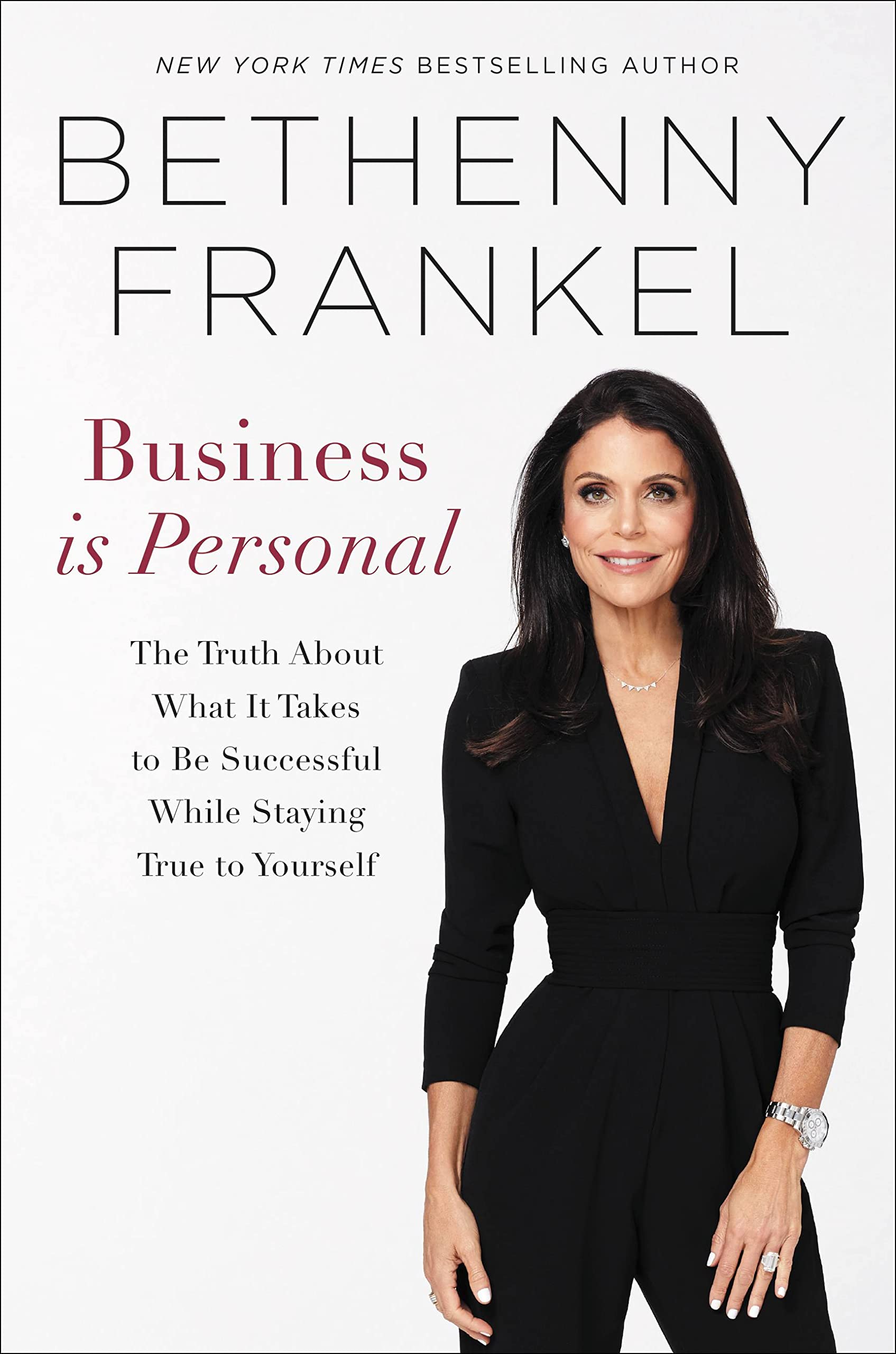
January
Business is Personal: The Truth About What It Takes to Be Successful While Staying True to Yourself
A New York Times bestselling author and successful businesswoman shares the advice she used to build a business and maintain balance as a media personality, mogul, and mother.
Consider this book your strategic toolbox, full of Bethenny’s smartest and most practical no-nonsense business principles and tactics, illustrated through her own compelling stories and lessons from the entrepreneurial front and experience building the successful Skinnygirl and Bethenny brands, becoming a successful television and podcast producer, and managing her philanthropic foundation. She also shares wisdom from her conversations with highly accomplished people from Mark Cuban to Hillary Clinton, Candace Bushnell to Matthew McConaughey and many more, on what it takes to be successful at every level in an authentic way.
So many women, including stay-at-home moms yearning for more, entrepreneurs, and 9-to-5ers see this time of disruption as an open road. As Bethenny says, the snow globe has been shaken. This is THE handbook to navigate what will come next. Whether you are new to business, a seasoned rainmaker, pivoting from a loss or layoff– or just finding your way– you will find value within these pages. This book will inspire you to act without fear, turn mistakes into masterstrokes, and keep you laughing along the way.
January
Business is Personal: The Truth About What It Takes to Be Successful While Staying True to Yourself

A New York Times bestselling author and successful businesswoman shares the advice she used to build a business and maintain balance as a media personality, mogul, and mother.
Consider this book your strategic toolbox, full of Bethenny’s smartest and most practical no-nonsense business principles and tactics, illustrated through her own compelling stories and lessons from the entrepreneurial front and experience building the successful Skinnygirl and Bethenny brands, becoming a successful television and podcast producer, and managing her philanthropic foundation. She also shares wisdom from her conversations with highly accomplished people from Mark Cuban to Hillary Clinton, Candace Bushnell to Matthew McConaughey and many more, on what it takes to be successful at every level in an authentic way.
So many women, including stay-at-home moms yearning for more, entrepreneurs, and 9-to-5ers see this time of disruption as an open road. As Bethenny says, the snow globe has been shaken. This is THE handbook to navigate what will come next. Whether you are new to business, a seasoned rainmaker, pivoting from a loss or layoff– or just finding your way– you will find value within these pages. This book will inspire you to act without fear, turn mistakes into masterstrokes, and keep you laughing along the way.

February
Good Boundaries and Goodbyes: Loving Others Without Losing the Best Of Who You Are
Everyone is talking about boundaries but what are they? Bestselling author Lysa Terkeurst is here with the tools you'll need to love others and yourself well in healthy relationships and even walk away when necessary. She even provides helpful scripts!
NEW YORK TIMES BESTSELLER
Relationships are wonderful . . . until they're not.
Stop the dysfunction of unhealthy relationships and learn biblical ways to set boundaries—and, when necessary, say goodbye.
Is it unloving or selfish to set a boundary with family members or friends? Are Christians ever called to walk away from a relationship that's no longer safe or sustainable? #1 New York Times bestselling author Lysa TerKeurst deeply understands these hard questions in the midst of relational struggles.
After thousands of hours of counseling intensives and extensive theological research that transformed the way she defined healthy relationships, Lysa is now more committed than ever to loving people well without losing the best of who she is.
February
Good Boundaries and Goodbyes: Loving Others Without Losing the Best Of Who You Are

Everyone is talking about boundaries but what are they? Bestselling author Lysa Terkeurst is here with the tools you'll need to love others and yourself well in healthy relationships and even walk away when necessary. She even provides helpful scripts!
NEW YORK TIMES BESTSELLER
Relationships are wonderful . . . until they're not.
Stop the dysfunction of unhealthy relationships and learn biblical ways to set boundaries—and, when necessary, say goodbye.
Is it unloving or selfish to set a boundary with family members or friends? Are Christians ever called to walk away from a relationship that's no longer safe or sustainable? #1 New York Times bestselling author Lysa TerKeurst deeply understands these hard questions in the midst of relational struggles.
After thousands of hours of counseling intensives and extensive theological research that transformed the way she defined healthy relationships, Lysa is now more committed than ever to loving people well without losing the best of who she is.
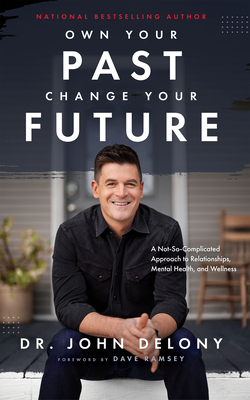
March
Own Your Past Change Your Future: A Not-So-Complicated Approach to Relationships, Mental Health & Wellness
#1 WALL STREET JOURNAL NATIONAL BESTSELLER
Your Mental Health Matters.
We’re the most technologically advanced society in history, but we’ve never been more stressed, medicated, or lonely. We have 1,000 Facebook friends but no one to help us move our couch. The pace of life is making us exhausted.
We’re all carrying the weight of our trauma based on the stories we were told by others and the ones we tell ourselves—and those stories are like bricks in a backpack that keep us from being happy and healthy. In his new book, national bestselling author Dr. John Delony provides a clear, five-step path to being well.
You’ll learn how to:
• Redefine what trauma is and how to identify it in your life.
• Grieve and heal from past hurt and trauma.
• Make friends as an adult—it’s not easy, but it is necessary.
• Change your thoughts—it’s possible.
• Assess and evaluate your actions—these can change too.
You’ll laugh. You’ll cry. Your thoughts and actions will be challenged. And if you take the steps John outlines, you’ll learn how to leave the past where it belongs and get on the path to healing.
March
Own Your Past Change Your Future: A Not-So-Complicated Approach to Relationships, Mental Health & Wellness

#1 WALL STREET JOURNAL NATIONAL BESTSELLER
Your Mental Health Matters.
We’re the most technologically advanced society in history, but we’ve never been more stressed, medicated, or lonely. We have 1,000 Facebook friends but no one to help us move our couch. The pace of life is making us exhausted.
We’re all carrying the weight of our trauma based on the stories we were told by others and the ones we tell ourselves—and those stories are like bricks in a backpack that keep us from being happy and healthy. In his new book, national bestselling author Dr. John Delony provides a clear, five-step path to being well.
You’ll learn how to:
• Redefine what trauma is and how to identify it in your life.
• Grieve and heal from past hurt and trauma.
• Make friends as an adult—it’s not easy, but it is necessary.
• Change your thoughts—it’s possible.
• Assess and evaluate your actions—these can change too.
You’ll laugh. You’ll cry. Your thoughts and actions will be challenged. And if you take the steps John outlines, you’ll learn how to leave the past where it belongs and get on the path to healing.
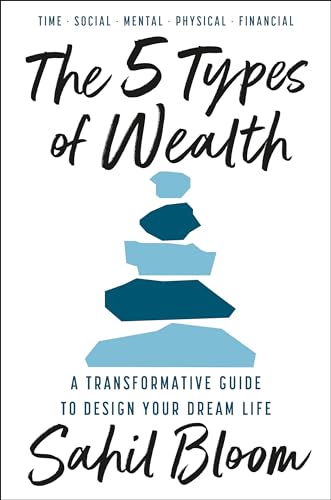
April
The 5 Types of Wealth: A Transformative Guide To Design Your Dream Life
THE INSTANT NEW YORK TIMES AND USA TODAY BESTSELLER
Reject the default path, define your priorities, and achieve lasting happiness with this transformative guide to your dream life—a life centered around the five types of wealth.
“A powerful call to action to think deeply about what lights you up—and a guide for how to build a life of meaning and purpose.”—Tim Cook, CEO of Apple
Throughout your life, you’ve been slowly indoctrinated to believe that money is the only type of wealth. In reality, your wealthy life may involve money, but in the end, it will be defined by everything else.
After three years of research, personal experimentation, and thousands of interviews across the globe, Sahil Bloom has created a groundbreaking blueprint to build your life around five types of wealth: Time Wealth, Social Wealth, Mental Wealth, Physical Wealth, and Financial Wealth. A life of true fulfillment engages all five types—working dynamically, in concert across the seasons of your journey.
Through powerful storytelling, science-backed practices, and actionable insights, in The 5 Types of Wealth, you’ll learn:
• How to prioritize energy-creating tasks to unlock more time in your day
• How to create deeper bonds and build a powerful network
• How to engage your purpose to spark continuous growth
• How to maximize health and vitality through three simple principles
• How to achieve financial independence and define your version of “enough”
No matter where you are on your path—a recent graduate, new parent, midlife warrior, retiree, or anything in between—The 5 Types of Wealth will help you act on your priorities to create an instant positive impact in your daily life, make better decisions, and design the life you’ve always dreamed of.

May
A Crown that Lasts: You Are Not Your Label
In A Crown that Lasts, former Miss Universe and Miss South Africa Demi Tebow confesses the danger of tying our identities to our accomplishments. Discover the truth of who you were created to be and how to use your platform, no matter how big or small, for eternal impact.
On this earth, a crown is what separates victors from the rest of the competitors, but the goal of creating a life worth living is not to gain a trophy, get a prize, or keep the crown. Our lives are not meant to be about being number one or making our own names known. While walking you through the journey of her evolving confidence—from basing her identity on temporary labels and her own efforts, to discovering the rock-solid security of anchoring her dreams in her Maker—Demi weaves her story together with the insights she's learned along the way.
A Crown that Lasts will show you how to
• Relate to the discomfort, confusion, and doubt that arises when you base your confidence on external things,
• Discover God-confidence when your plans take unexpected detours,
• Know what do when planted in unknown territory,
• Use your story to grow an eternal impact, and
• Stay grounded in the truth of who you are in Christ.
The purpose of our lives is to love and serve God and others. Demi shows how you can be encouraged to focus not just on your aspirations, but on your greater purpose and leave behind a footprint of significance, not just success.
May
A Crown that Lasts: You Are Not Your Label

In A Crown that Lasts, former Miss Universe and Miss South Africa Demi Tebow confesses the danger of tying our identities to our accomplishments. Discover the truth of who you were created to be and how to use your platform, no matter how big or small, for eternal impact.
On this earth, a crown is what separates victors from the rest of the competitors, but the goal of creating a life worth living is not to gain a trophy, get a prize, or keep the crown. Our lives are not meant to be about being number one or making our own names known. While walking you through the journey of her evolving confidence—from basing her identity on temporary labels and her own efforts, to discovering the rock-solid security of anchoring her dreams in her Maker—Demi weaves her story together with the insights she's learned along the way.
A Crown that Lasts will show you how to
• Relate to the discomfort, confusion, and doubt that arises when you base your confidence on external things,
• Discover God-confidence when your plans take unexpected detours,
• Know what do when planted in unknown territory,
• Use your story to grow an eternal impact, and
• Stay grounded in the truth of who you are in Christ.
The purpose of our lives is to love and serve God and others. Demi shows how you can be encouraged to focus not just on your aspirations, but on your greater purpose and leave behind a footprint of significance, not just success.
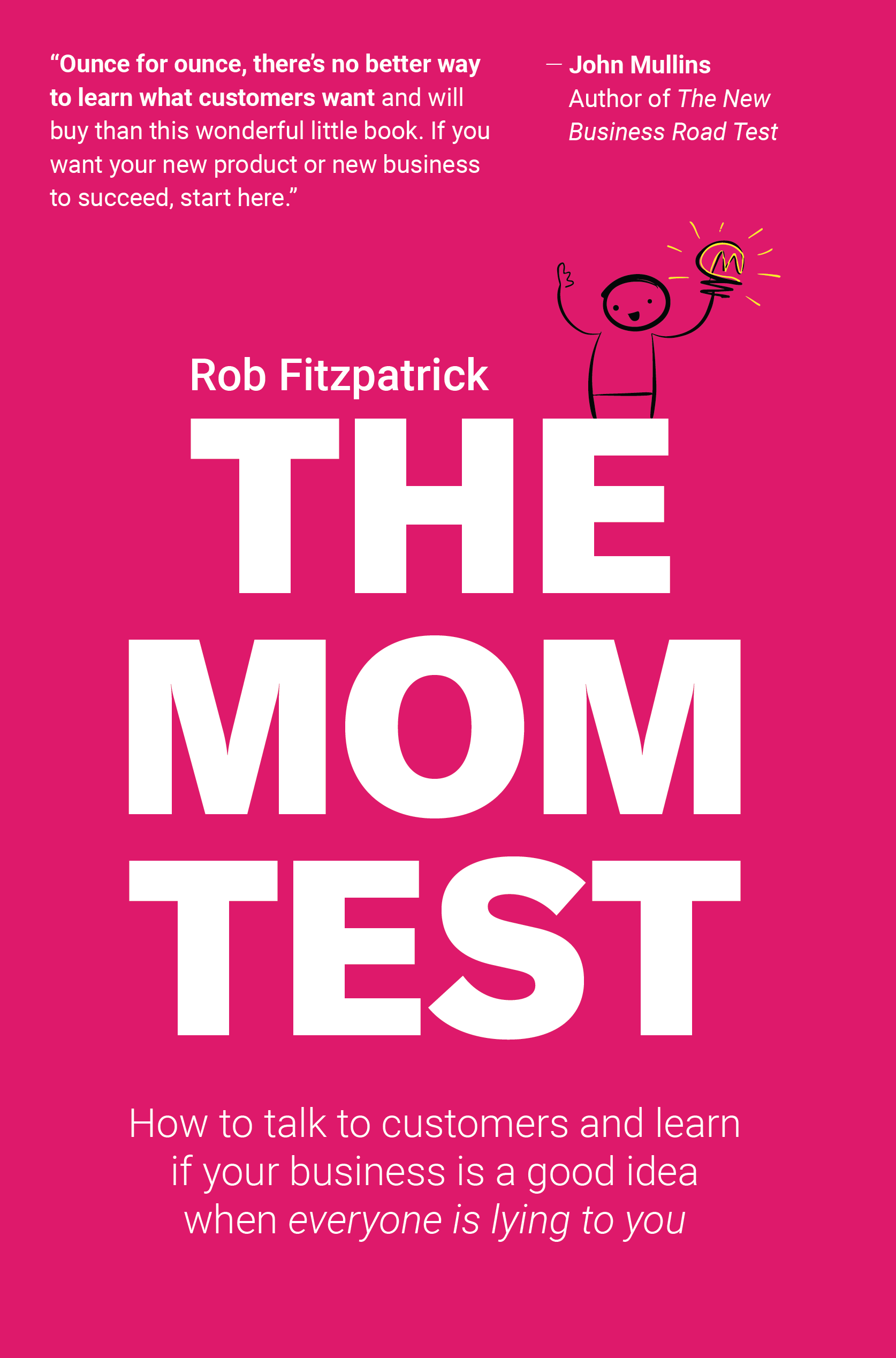
June Summer Series #1
The Mom Test: How to Talk to Customers & Learn if Your Business Is a Good Idea When Everyone Is Lying to You
The Mom Test is a quick, practical guide that will save you time, money, and heartbreak.
They say you shouldn't ask your mom whether your business is a good idea, because she loves you and will lie to you. This is technically true, but it misses the point. You shouldn't ask anyone if your business is a good idea. It's a bad question and everyone will lie to you at least a little . As a matter of fact, it's not their responsibility to tell you the truth. It's your responsibility to find it and it's worth doing right.
Talking to customers is one of the foundational skills of both Customer Development and Lean Startup. We all know we're supposed to do it, but nobody seems willing to admit that it's easy to screw up and hard to do right. This book is going to show you how customer conversations go wrong and how you can do better.
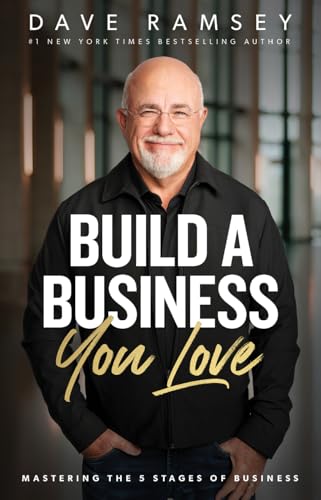
June Summer Series #2
Build A Business You Love: Mastering the Five Stages of Business
In Build a Business You Love, #1 New York Times bestselling author and Ramsey Solutions Founder and CEO, Dave Ramsey breaks down the system that took his business from a card table in his living room to a $250 million operation.
Business leaders face all kinds of challenges and fears as they work to grow their business. Dave Ramsey gets it—because he’s been there. Over the past 30 years, he and his team have taken some right (and plenty of wrong) turns as they worked to build his one-man financial counseling business into Ramsey Solutions, a $250 million company with over 1,000 team members. Now, Dave is sharing what he’s learned from walking through three decades of business growth—so you can grow your business faster with fewer missteps.
In Build a Business You Love, Dave lays out the EntreLeadership System, the road map that takes the guesswork out of growth for business owners like you. Because after more than a decade of helping leaders grow their businesses—and through direct experience with his own company—Dave has found that there are five distinct stages of growth every business has to conquer to reach its potential:
• Stage 1: Treadmill Operator
• Stage 2: Pathfinder
• Stage 3: Trailblazer
• Stage 4: Peak Performer
• Stage 5: Legacy Builder
Throughout the book, Dave breaks down each of the stages and their unique challenges in detail to help you solve the right problems, at the right time, in the right way. You’ll learn how to navigate everything business ownership throws at you—from hiring the right people, to finding and training leaders, to creating and operating a budget, to nailing down strategic plans that get results, and more.
Build a Business You Love is the essential guide for business owners who want to grow their business the right way and leave a legacy they’re proud of.
June Summer Series #1
The Mom Test: How to Talk to Customers & Learn if Your Business Is a Good Idea When Everyone Is Lying to You

The Mom Test is a quick, practical guide that will save you time, money, and heartbreak.
They say you shouldn't ask your mom whether your business is a good idea, because she loves you and will lie to you. This is technically true, but it misses the point. You shouldn't ask anyone if your business is a good idea. It's a bad question and everyone will lie to you at least a little . As a matter of fact, it's not their responsibility to tell you the truth. It's your responsibility to find it and it's worth doing right.
Talking to customers is one of the foundational skills of both Customer Development and Lean Startup. We all know we're supposed to do it, but nobody seems willing to admit that it's easy to screw up and hard to do right. This book is going to show you how customer conversations go wrong and how you can do better.
June Summer Series #2
Build A Business You Love: Mastering the Five Stages of Business

In Build a Business You Love, #1 New York Times bestselling author and Ramsey Solutions Founder and CEO, Dave Ramsey breaks down the system that took his business from a card table in his living room to a $250 million operation.
Business leaders face all kinds of challenges and fears as they work to grow their business. Dave Ramsey gets it—because he’s been there. Over the past 30 years, he and his team have taken some right (and plenty of wrong) turns as they worked to build his one-man financial counseling business into Ramsey Solutions, a $250 million company with over 1,000 team members. Now, Dave is sharing what he’s learned from walking through three decades of business growth—so you can grow your business faster with fewer missteps.
In Build a Business You Love, Dave lays out the EntreLeadership System, the road map that takes the guesswork out of growth for business owners like you. Because after more than a decade of helping leaders grow their businesses—and through direct experience with his own company—Dave has found that there are five distinct stages of growth every business has to conquer to reach its potential:
• Stage 1: Treadmill Operator
• Stage 2: Pathfinder
• Stage 3: Trailblazer
• Stage 4: Peak Performer
• Stage 5: Legacy Builder
Throughout the book, Dave breaks down each of the stages and their unique challenges in detail to help you solve the right problems, at the right time, in the right way. You’ll learn how to navigate everything business ownership throws at you—from hiring the right people, to finding and training leaders, to creating and operating a budget, to nailing down strategic plans that get results, and more.
Build a Business You Love is the essential guide for business owners who want to grow their business the right way and leave a legacy they’re proud of.
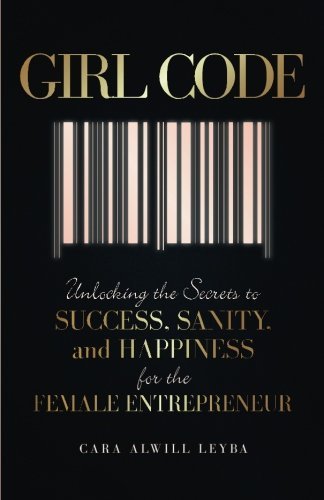
July Summer Series #1
Girl Code: Unlocking the Secrets to Success, Sanity, and Happiness for the Female Entreprenuer
Women around the world have responded to Cara Alwill Leyba’s Girl Code with a resounding YES. Companies like Kate Spade and Macy’s have brought her in to teach “the Code.” Inc. magazine named Girl Code one of the “Top 9 Inspiring Books Every Female Entrepreneur Should Read” alongside Lean In, #Girlboss, and Thrive.
A few years ago, I made a crazy claim in the first edition of Girl Code: that in today’s competitive marketplace, the fiercest thing a female entrepreneur can do is to support other women.
Something dynamic happens when women genuinely show up for each other. When we lose the facades, cut the bullsh*t, and truly have each other’s backs. When we stop pretending everything is perfect, and show the messy, beautiful parts of ourselves and our work—which all look awfully similar. When we talk about our fears, our missteps, and our breakdowns. And most importantly, when we share our celebrations, our breakthroughs, and our solutions.
I’m convinced that there’s no reason to hoard information, connections, or insight. Wisdom is meant to be shared, so let’s start sharing what we’ve learned to make each other better. Let’s start building each other up. Let’s live up to our potential and start ruling the world.
Girl Code is a roadmap for female entrepreneurs, professional women, “side hustlers” (those with a day job plus a part-time small business), and anyone in between. This book won’t teach you how to build a multimillion-dollar company. It won’t teach you about systems or finance. But it will teach you how to build confidence in yourself, reconnect with your “why,” eradicate jealousy, and ultimately learn the power of connection. Because at the end of the day, that’s what life and business are all about.
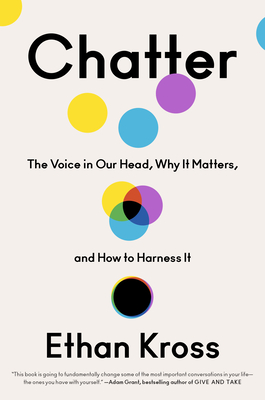
July Summer Series #2
Chatter: The Voice in Our Head, Why It Matters, and How to Harness It
One of the best new books of the year—The Washington Post, BBC, USA Today, CNN Underscored, Shape, Behavioral Scientist, PopSugar • Kirkus Reviews, Publishers Weekly, and Shelf Awareness starred reviews
Is talking to yourself normal? The truth is that we all have a voice in our head. When we talk to ourselves, we often hope to tap into our inner coach but find our inner critic instead. When we’re facing a tough task, our inner coach can buoy us up: Focus—you can do this. But, just as often, our inner critic sinks us entirely: I’m going to fail. They’ll all laugh at me. What’s the use?
In Chatter, acclaimed psychologist Ethan Kross explores the silent conversations we have with ourselves. Interweaving groundbreaking behavioral and brain research from his own lab with real-world case studies—from a pitcher who forgets how to pitch, to a Harvard undergrad negotiating her double life as a spy—Kross explains how these conversations shape our lives, work, and relationships. He warns that giving in to negative and disorienting self-talk—what he calls “chatter”—can tank our health, sink our moods, strain our social connections, and cause us to fold under pressure.
But the good news is that we’re already equipped with the tools we need to make our inner voice work in our favor. These tools are often hidden in plain sight—in the words we use to think about ourselves, the technologies we embrace, the diaries we keep in our drawers, the conversations we have with our loved ones, and the cultures we create in our schools and workplaces.
Brilliantly argued, expertly researched, and filled with compelling stories, Chatter gives us the power to change the most important conversation we have each day: the one we have with ourselves.
July Summer Series #1
Girl Code: Unlocking the Secrets to Success, Sanity, and Happiness for the Femal Entreprenuer

Women around the world have responded to Cara Alwill Leyba’s Girl Code with a resounding YES. Companies like Kate Spade and Macy’s have brought her in to teach “the Code.” Inc. magazine named Girl Code one of the “Top 9 Inspiring Books Every Female Entrepreneur Should Read” alongside Lean In, #Girlboss, and Thrive.
A few years ago, I made a crazy claim in the first edition of Girl Code: that in today’s competitive marketplace, the fiercest thing a female entrepreneur can do is to support other women.
Something dynamic happens when women genuinely show up for each other. When we lose the facades, cut the bullsh*t, and truly have each other’s backs. When we stop pretending everything is perfect, and show the messy, beautiful parts of ourselves and our work—which all look awfully similar. When we talk about our fears, our missteps, and our breakdowns. And most importantly, when we share our celebrations, our breakthroughs, and our solutions.
I’m convinced that there’s no reason to hoard information, connections, or insight. Wisdom is meant to be shared, so let’s start sharing what we’ve learned to make each other better. Let’s start building each other up. Let’s live up to our potential and start ruling the world.
Girl Code is a roadmap for female entrepreneurs, professional women, “side hustlers” (those with a day job plus a part-time small business), and anyone in between. This book won’t teach you how to build a multimillion-dollar company. It won’t teach you about systems or finance. But it will teach you how to build confidence in yourself, reconnect with your “why,” eradicate jealousy, and ultimately learn the power of connection. Because at the end of the day, that’s what life and business are all about.
July Summer Series #2
Chatter: The Voice in Our Head, Why It Matters, and How to Harness It

Is talking to yourself normal? The truth is that we all have a voice in our head. When we talk to ourselves, we often hope to tap into our inner coach but find our inner critic instead. When we’re facing a tough task, our inner coach can buoy us up: Focus—you can do this. But, just as often, our inner critic sinks us entirely: I’m going to fail. They’ll all laugh at me. What’s the use?
In Chatter, acclaimed psychologist Ethan Kross explores the silent conversations we have with ourselves. Interweaving groundbreaking behavioral and brain research from his own lab with real-world case studies—from a pitcher who forgets how to pitch, to a Harvard undergrad negotiating her double life as a spy—Kross explains how these conversations shape our lives, work, and relationships. He warns that giving in to negative and disorienting self-talk—what he calls “chatter”—can tank our health, sink our moods, strain our social connections, and cause us to fold under pressure.
But the good news is that we’re already equipped with the tools we need to make our inner voice work in our favor. These tools are often hidden in plain sight—in the words we use to think about ourselves, the technologies we embrace, the diaries we keep in our drawers, the conversations we have with our loved ones, and the cultures we create in our schools and workplaces.
Brilliantly argued, expertly researched, and filled with compelling stories, Chattergives us the power to change the most important conversation we have each day: the one we have with ourselves.
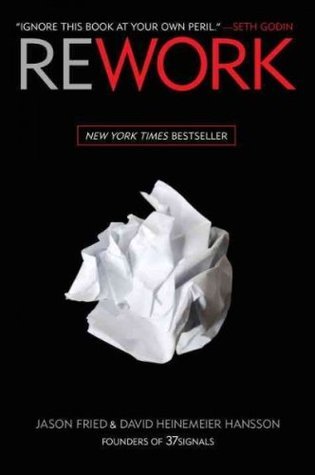
August Summer Series #1
Rework
Rework shows you a better, faster, easier way to succeed in business.
Most business books give you the same old advice: Write a business plan, study the competition, seek investors, yadda yadda. If you're looking for a book like that, put this one back on the shelf.
Read it and you'll know why plans are actually harmful, why you don't need outside investors, and why you're better off ignoring the competition. The truth is, you need less than you think. You don't need to be a workaholic. You don't need to staff up. You don't need to waste time on paperwork or meetings. You don't even need an office. Those are all just excuses.
What you really need to do is stop talking and start working. This book shows you the way. You'll learn how to be more productive, how to get exposure without breaking the bank, and tons more counterintuitive ideas that will inspire and provoke you.
With its straightforward language and easy-is-better approach, Rework is the perfect playbook for anyone who’s ever dreamed of doing it on their own. Hardcore entrepreneurs, small-business owners, people stuck in day jobs they hate, victims of "downsizing," and artists who don’t want to starve anymore will all find valuable guidance in these pages.
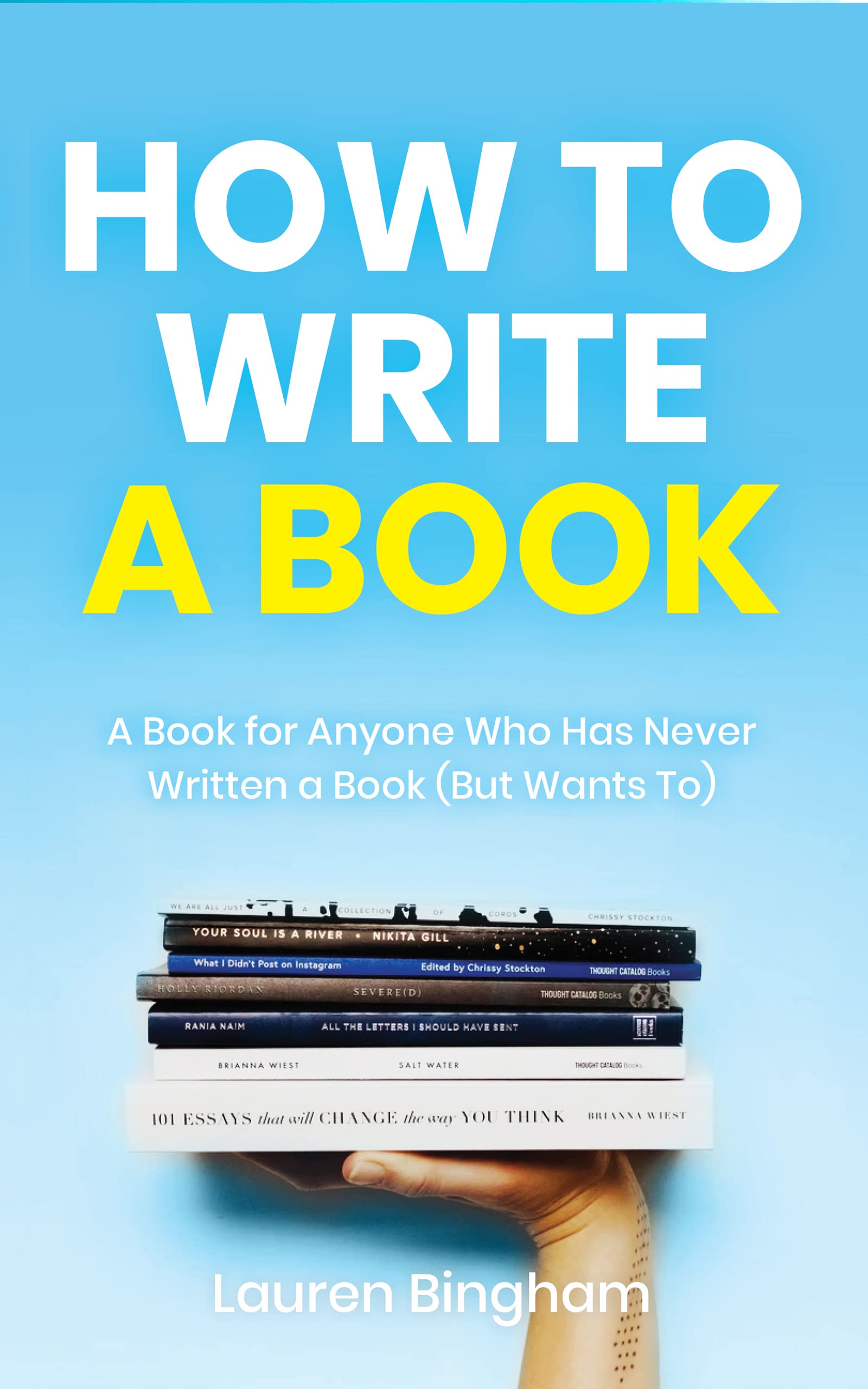
August Summer Series #2
How to Write a Book: A Book for Anyone Who Has Never Written a Book (But Wants To)
Are you interested in writing your own book?
Many of us would love to jot down our fondest stories and our tallest tales to preserve forever in written form. But wanting to do something and knowing how
to do it are two different things.
So many individuals want to write a book but don’t know exactly how to get into the state of mind to make this happen. Perhaps you can come up with a tale to tell, but writing your own story seems like a mystery. How do you choose what words to use? How do you know if your idea is good enough? Even worse—what if you’re terrible at it?
Whether you’re a born storyteller or need a little assistance from spellcheck and the thesaurus, Lauren Bingham is here to help you make it the “write time” to learn how to write a book.
August Summer Series #1
Rework

Rework shows you a better, faster, easier way to succeed in business.
Most business books give you the same old advice: Write a business plan, study the competition, seek investors, yadda yadda. If you're looking for a book like that, put this one back on the shelf.
Read it and you'll know why plans are actually harmful, why you don't need outside investors, and why you're better off ignoring the competition. The truth is, you need less than you think. You don't need to be a workaholic. You don't need to staff up. You don't need to waste time on paperwork or meetings. You don't even need an office. Those are all just excuses.
What you really need to do is stop talking and start working. This book shows you the way. You'll learn how to be more productive, how to get exposure without breaking the bank, and tons more counterintuitive ideas that will inspire and provoke you.
With its straightforward language and easy-is-better approach, Rework is the perfect playbook for anyone who’s ever dreamed of doing it on their own. Hardcore entrepreneurs, small-business owners, people stuck in day jobs they hate, victims of "downsizing," and artists who don’t want to starve anymore will all find valuable guidance in these pages.
August Summer Series #2
How to Write a Book: A Book for Anyone Who Has Never Written a Book (But Wants To)

Are you interested in writing your own book?
Many of us would love to jot down our fondest stories and our tallest tales to preserve forever in written form. But wanting to do something and knowing how
to do it are two different things.
So many individuals want to write a book but don’t know exactly how to get into the state of mind to make this happen. Perhaps you can come up with a tale to tell, but writing your own story seems like a mystery. How do you choose what words to use? How do you know if your idea is good enough? Even worse—what if you’re terrible at it?
Whether you’re a born storyteller or need a little assistance from spellcheck and the thesaurus, Lauren Bingham is here to help you make it the “write time” to learn how to write a book.
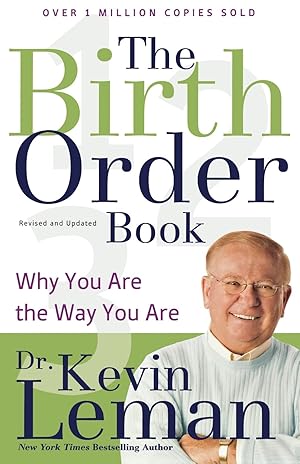
September
The Birth Order Book: Why You Are the Way You Are
OVER 1 MILLION COPIES SOLD
Firstborn? Only child? Middle child? Baby of the family? Find out what it means to you, your relationships, and your career.
Ever wonder why you just can't get along with certain people? Why you pick the friends you do? Why you chose the career path you're on? It's all about birth order.
Birth order powerfully influences who you are, whom you marry, the job you choose, and the kind of parent you are. Dr. Kevin Leman's classic guide, The Birth Order Book, will help you
● better understand yourself
● get along with others
● overcome ingrained tendencies
● be more successful in the workplace
● be a more effective parent
● and more
Thousands of people have unlocked the secrets of birth order already. Shouldn't you be one of them?
September
The Birth Order Book: Why You Are the Way You Are

OVER 1 MILLION COPIES SOLD
Firstborn? Only child? Middle child? Baby of the family? Find out what it means to you, your relationships, and your career.
Ever wonder why you just can't get along with certain people? Why you pick the friends you do? Why you chose the career path you're on? It's all about birth order.
Birth order powerfully influences who you are, whom you marry, the job you choose, and the kind of parent you are. Dr. Kevin Leman's classic guide, The Birth Order Book, will help you
● better understand yourself
● get along with others
● overcome ingrained tendencies
● be more successful in the workplace
● be a more effective parent
● and more
Thousands of people have unlocked the secrets of birth order already. Shouldn't you be one of them?
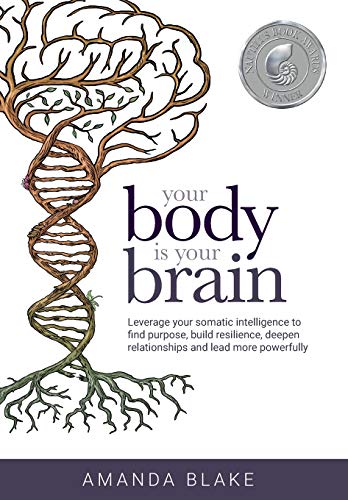
October
Your Body is Your Brain: Leverage Your Somatic Intelligence to Find Purpose, Build Resilience, Deepen Relationships and Lead More Powerfully
WINNER: Nautilus Books for a Better World - Social Science
Around the world, a swelling tide of people are discovering an astonishing, life-altering truth. This book tells their extraordinary stories:
● an anxious PhD student builds his confidence by changing his workout
● back exercises help one woman negotiate a fix to a botched home repair
● a Microsoft executive grows credibility by shifting her stance
● an executive team leads their company to a 30% increase in valuation by dancing together
In this timely and engaging book, Amanda Blake synthesizes research from over two dozen scientific fields to reveal how you, too, can come to embody vital qualities such as these:
● align your daily activities with a deeper sense of meaning and purpose
● become more relaxed, confident, and at ease in high-pressure situations
● shatter limitations that have been immune to "the power of positive thinking"
● create better relationships at work and at home
● turn conflict into opportunity
...and many more valuable skills that will enable you to contribute, succeed and enjoy life at the highest levels. Strengthen your social and emotional intelligence by cultivating your innate somatic intelligence. This is powerful applied mind-body science, in the workplace and beyond. Tap the intelligence hidden in posture, gesture, and sensation and you will open the door to more meaning, greater courage, deeper connection, and more powerful leadership than you imagined possible.
WINNER: International Book Awards - Psychology/Mental Health
WINNER: Indie Excellence Awards - Leadership
October
Your Body is Your Brain: Leverage Your Somatic Intelligence to Find Purpose, Build Resilience, Deepen Relationships and Lead More Powerfully

WINNER: Nautilus Books for a Better World - Social Science
Around the world, a swelling tide of people are discovering an astonishing, life-altering truth. This book tells their extraordinary stories:
● an anxious PhD student builds his confidence by changing his workout
● back exercises help one woman negotiate a fix to a botched home repair
● a Microsoft executive grows credibility by shifting her stance
● an executive team leads their company to a 30% increase in valuation by dancing together
In this timely and engaging book, Amanda Blake synthesizes research from over two dozen scientific fields to reveal how you, too, can come to embody vital qualities such as these:
● align your daily activities with a deeper sense of meaning and purpose
● become more relaxed, confident, and at ease in high-pressure situations
● shatter limitations that have been immune to "the power of positive thinking"
● create better relationships at work and at home
● turn conflict into opportunity
...and many more valuable skills that will enable you to contribute, succeed and enjoy life at the highest levels. Strengthen your social and emotional intelligence by cultivating your innate somatic intelligence. This is powerful applied mind-body science, in the workplace and beyond. Tap the intelligence hidden in posture, gesture, and sensation and you will open the door to more meaning, greater courage, deeper connection, and more powerful leadership than you imagined possible.
WINNER: International Book Awards - Psychology/Mental Health
WINNER: Indie Excellence Awards - Leadership

November
The Universe Has Your Back - Transform Fear to Faith
Now in tradepaper: New York Times best-selling author offers simple prayers, affirmations, and exercises to support readers in releasing old thought systems and fears, and a return to peace.
Through acceptance, surrender, and a commitment to her continually evolving spiritual path, New York Times best-selling author and international speaker Gabrielle Bernstein has been transforming her fear into faith. Her stories and universal lessons provide a framework for releasing the blocks to what everyone most longs for: happiness, security, and clear direction. These lessons can help us relinquish the need to control in order to relax into a sense of certainty and freedom—to stop chasing life and truly live.
Ride the swell of your energy and true power to find strength when you are down, synchronicity and support when you are lost, safety in the face of uncertainty, and joy in what might otherwise be pain. Bernstein has secrets to reveal, and she is determined to unleash the presence of your power with the comforting knowledge that the Universe has your back.
November
The Universe Has Your Back - Transform Fear to Faith

Now in tradepaper: New York Times best-selling author offers simple prayers, affirmations, and exercises to support readers in releasing old thought systems and fears, and a return to peace.
Through acceptance, surrender, and a commitment to her continually evolving spiritual path, New York Times best-selling author and international speaker Gabrielle Bernstein has been transforming her fear into faith. Her stories and universal lessons provide a framework for releasing the blocks to what everyone most longs for: happiness, security, and clear direction. These lessons can help us relinquish the need to control in order to relax into a sense of certainty and freedom—to stop chasing life and truly live.
Ride the swell of your energy and true power to find strength when you are down, synchronicity and support when you are lost, safety in the face of uncertainty, and joy in what might otherwise be pain. Bernstein has secrets to reveal, and she is determined to unleash the presence of your power with the comforting knowledge that the Universe has your back.
